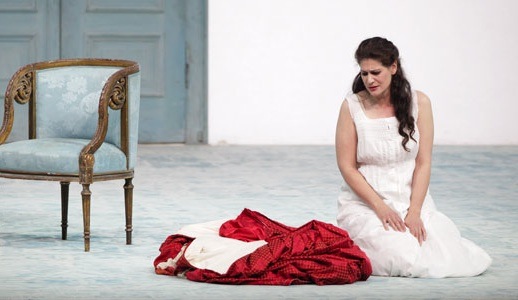

Hers is an Italianate stage bearing, no matter the Greek and German parentage, and she inhabits Verdi’s Elisabeth (Elisabetta, heard in January) and this Mozart snugly indeed, a Fach-defying professional. “Dove sono” begot a dead hush in the Nationaltheater, instilled compellingly at “E Susanna non vien!”
As her husband, Simon Keenlyside modulated with brio between arrogance and suppleness through the course of the evening, his baritone showing no sign of wear. Angela Brower, a winning Nicklausse in the Constantinos Carydis Hoffmann last fall, has curves in all the wrong places to be credible as his page boy but her mezzo-soprano projected beautifully and her teamwork shone.
After a quiet start, Luca Pisaroni filled the former barber’s shoes with a plucky sense of his own value and firm bass projection. Heike Grötzinger trampolined suggestively on her lost son’s bed in Act I yet cozily received him in fetal position during his Act IV panic. She is a fine singer; too bad someone cut “Il capro e la capretta.” Christoph Stephinger evinced minor strain as Bartolo the father.
Adriana Ku?erová introduced a cutesy Susanna but could not be heard much of the time. (She has withdrawn sick from the rest of this run, with the metallic Laura Tatulescu jumping in.) Kevin Conners faltered amusingly as lawyer Curzio while veteran Ulrich Reß relished his job as music-master, leading the chorus to Keenlyside’s palpable annoyance. Veteran of veterans Alfred Kuhn—an erstwhile institution here as Frank in Die Fledermaus and alas not scheduled to sing the role this coming December—sputtered gloriously as the gardiner. Evgeniya Sotnikova simpered con dolcezza in the brief duties of his Barbarina.
Dieter Dorn’s aging staging uses stretched white fabric over wooden frames. Though not deep, this setup dampened the voices on Thursday instead of projecting them, causing an all-evening imbalance with the orchestra.
This problem had me wondering anew about those production roles. Was it, is it, ultimately Dorn’s fault or his set designer’s? In the ways the staging worked well—the werktreu characters and properly motivated action, directorial Job One—are we to credit Dorn or the dramaturgy of Hans-Joachim Ruckhäberle?
In any case it is Dorn who fails to move us into the garden at night in Act IV, a flouting of both da Ponte’s libretto and the music, which positively breathes the night air. We are instead stuck inside, facing non-instructive maneuvers with white sheets.
Dan Ettinger managed to ruin a “Carmen” last season with rash conducting. His Mozart is another story: cold and rigid, also propulsive and consistent.
























Comments